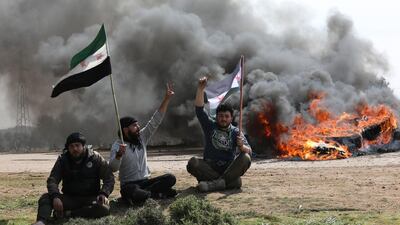Russia and Turkey cut short their first joint patrol in Syria's Idlib on Sunday after rebels and civilians opposed to a ceasefire agreement cut off a main roadway to block its path, witnesses and Russian news agencies reported.
The patrol on the M4 highway in Idlib province was the result of a March 5 ceasefire accord between Moscow and Ankara, which back opposing sides in Syria’s nine-year war. The ceasefire has largely held since then.
Under the deal, which halted hostilities after an escalation of violence that displaced almost a million people, Turkish and Russian forces are to establish a security corridor on either side of the M4, as well as carry out joint patrols along it.
But on Sunday hundreds of civilians and rebels cut off the roadway, rejecting the presence of Russian forces and what they said was an agreement that did not guarantee their re-settlement after being pushed out by violence.
“If the patrols happen without people being able to return to their lands, we oppose them,” said Osama Rahal, a military commander with the Syrian National Army, a Turkey-backed rebel group.
Protesters, some waving Syrian National Army flags, climbed on to Turkish tanks or stood in their path, witnesses said. Photos posted by the Syrian Observatory, a Britain-based war monitor, showed people lighting fires in the street and forming human chains.
“We are at odds with Russians who have been killing us for six years and have bombed us by air. So we oppose their entry into our towns,” said Ahmed Shehad, 22.
The Russian Defence Ministry said the joint patrols were cut short because of rebel “provocations” and civilians being used as a human shield, forcing them to take a shorter route, according to Russian news agency RIA.
Ankara has been given more time to rein in rebels undermining the patrols, the Russian defence ministry said.
The Turkish Defence Ministry said the first patrol had been completed with air and land assets. It released photos showing Russian and Turkish military vehicles travelling along a highway and officers in discussion as they looked at a map.
It subsequently said the sides in coordination "took necessary measures, with the aim of preventing potential provocations and harm to the civilian population in the region".




















